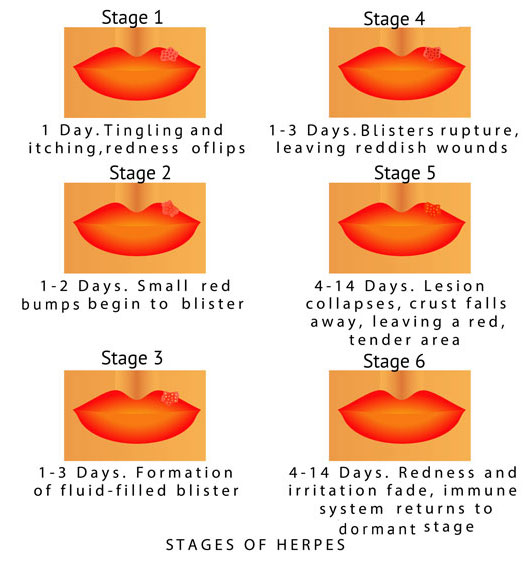How to heal herpes sores faster
The healing process for herpes sores involves several stages, and the duration can vary from person to person.
The progression of a herpes sore typically involves distinct stages. The prodrome stage initiates the process with sensations like tingling or itching in the affected area, signaling an impending outbreak. Subsequently, small fluid-filled blisters emerge, indicating the formation of sores during the active outbreak.
As the blisters rupture, open sores are revealed, making the affected area more susceptible to bacterial infection. Following this, a natural healing mechanism begins with the formation of crusts or scabs over the sores. As time progresses, the scabs eventually fall off, unveiling healed skin underneath.
The entire cycle, from the prodrome to the resolution stage, can span several days to weeks, contingent on various factors, including individual immune response and outbreak severity. Throughout this process, antiviral medications, good hygiene practices, and other supportive measures may be employed to manage symptoms and expedite healing.

There are strategies to manage symptoms, reduce the severity of outbreaks, and promote faster healing of herpes sores. Here are some tips for managing and accelerating the healing process of herpes sores:
Antiviral Medications
Prescription antiviral medications, such as acyclovir, valacyclovir, and famciclovir, are commonly used to manage herpes symptoms. These medications can help reduce the severity and duration of outbreaks. Consult with a healthcare professional to determine the appropriate antiviral treatment for your situation.
Early Intervention
Start antiviral treatment as soon as you notice the first signs of an outbreak. Early intervention can help limit the severity of symptoms and speed up the healing process.
Maintain Good Hygiene
Keep the affected area clean and dry to prevent bacterial infection. Gently wash the sores with mild soap and water, and avoid harsh or scented products that may irritate the skin.
Gently wash the blisters.Use a washcloth soaked in warm, soapy water and gently wash the blisters. Make sure to wash the cloth in a hot soapy cycle before using it again. You can put a topical cream such as tetracaine or lidocaine on blisters after you’ve washed them to relieve pain and itching.
If you have external blisters during an outbreak, break and wash them immediately. This may help heal the outbreak and keep it from spreading. Break the blisters in the shower by using clean washcloth soaked in warm, soapy water. Make sure to wash the cloth in a hot soapy cycle in your washing machine before using it again.
Clean the blisters with rubbing alcohol on the first and second days to kill any virus and sterilize the area. You can also use warm soapy water if the alcohol is too painful.
Cover the area with gauze or a sterile pad to keep any blister fluid from spreading. Do not break internal lesions. Consult your doctor if you have an outbreak that is on the inside of your body.
Use Topical Treatments
Over-the-counter creams or ointments containing numbing agents like lidocaine or antiviral ingredients like docosanol may provide relief from pain and itching. Consult with your healthcare provider before using any topical treatments.
Apply Warm Compresses
Using a warm compress on the sores can help soothe the affected area and promote healing. Be sure not to share towels or compresses to avoid spreading the virus.
2024 No.1 Herpes Dating Site

Worrry about herpes transmission? Meet nearby HSV-2 positive singles now!
Stay Hydrated
Drinking plenty of water is essential for overall health and can help maintain moisture in the affected area. Proper hydration supports the body's natural healing processes.
Boost the Immune System
A healthy immune system is crucial for managing herpes outbreaks. Adopt a balanced diet rich in fruits, vegetables, whole grains, and lean proteins. Regular exercise, adequate sleep, and stress management contribute to overall immune health.
Supplements
Some individuals find that certain supplements, such as L-lysine, may help reduce the frequency and severity of outbreaks. Consult with a healthcare professional before taking any supplements to ensure they are safe for you.
Prescription Pain Medications
For severe pain associated with herpes sores, your healthcare provider may prescribe pain medications. Follow their recommendations and use medications as directed.
Avoid Sexual Activity During Outbreaks
To prevent the spread of herpes, it is advisable to abstain from sexual activity during outbreaks. If sexual activity occurs, use condoms consistently.
Avoid Triggers
Identify and avoid factors that trigger herpes outbreaks. Common triggers include stress, fatigue, illness, and certain foods. Taking steps to manage stress through relaxation techniques can be beneficial.
Seek Emotional Support
Dealing with herpes can be emotionally challenging. Seek support from friends, family, or a healthcare professional to address any concerns or emotional distress.
2024 No.1 Herpes Dating Site

ating in the herpes community is stress-free. No need to explain. Meet nearby HSV-2 positive singles now!